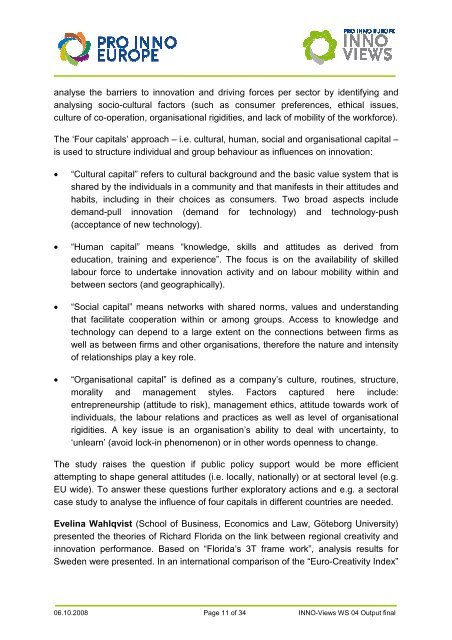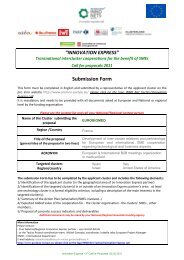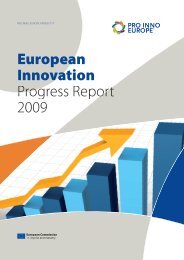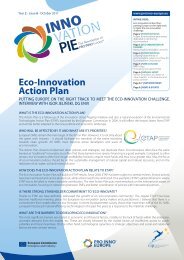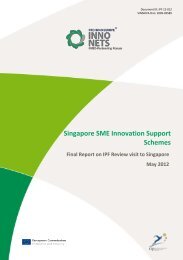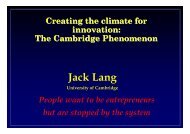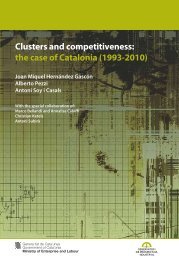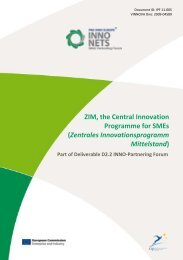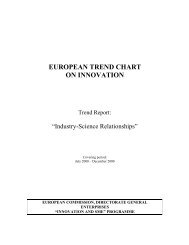The workshop in brief - PRO INNO Europe
The workshop in brief - PRO INNO Europe
The workshop in brief - PRO INNO Europe
You also want an ePaper? Increase the reach of your titles
YUMPU automatically turns print PDFs into web optimized ePapers that Google loves.
analyse the barriers to <strong>in</strong>novation and driv<strong>in</strong>g forces per sector by identify<strong>in</strong>g and<br />
analys<strong>in</strong>g socio-cultural factors (such as consumer preferences, ethical issues,<br />
culture of co-operation, organisational rigidities, and lack of mobility of the workforce).<br />
<strong>The</strong> ‘Four capitals’ approach – i.e. cultural, human, social and organisational capital –<br />
is used to structure <strong>in</strong>dividual and group behaviour as <strong>in</strong>fluences on <strong>in</strong>novation:<br />
• “Cultural capital” refers to cultural background and the basic value system that is<br />
shared by the <strong>in</strong>dividuals <strong>in</strong> a community and that manifests <strong>in</strong> their attitudes and<br />
habits, <strong>in</strong>clud<strong>in</strong>g <strong>in</strong> their choices as consumers. Two broad aspects <strong>in</strong>clude<br />
demand-pull <strong>in</strong>novation (demand for technology) and technology-push<br />
(acceptance of new technology).<br />
• “Human capital” means “knowledge, skills and attitudes as derived from<br />
education, tra<strong>in</strong><strong>in</strong>g and experience”. <strong>The</strong> focus is on the availability of skilled<br />
labour force to undertake <strong>in</strong>novation activity and on labour mobility with<strong>in</strong> and<br />
between sectors (and geographically).<br />
• “Social capital” means networks with shared norms, values and understand<strong>in</strong>g<br />
that facilitate cooperation with<strong>in</strong> or among groups. Access to knowledge and<br />
technology can depend to a large extent on the connections between firms as<br />
well as between firms and other organisations, therefore the nature and <strong>in</strong>tensity<br />
of relationships play a key role.<br />
• “Organisational capital” is def<strong>in</strong>ed as a company’s culture, rout<strong>in</strong>es, structure,<br />
morality and management styles. Factors captured here <strong>in</strong>clude:<br />
entrepreneurship (attitude to risk), management ethics, attitude towards work of<br />
<strong>in</strong>dividuals, the labour relations and practices as well as level of organisational<br />
rigidities. A key issue is an organisation’s ability to deal with uncerta<strong>in</strong>ty, to<br />
‘unlearn’ (avoid lock-<strong>in</strong> phenomenon) or <strong>in</strong> other words openness to change.<br />
<strong>The</strong> study raises the question if public policy support would be more efficient<br />
attempt<strong>in</strong>g to shape general attitudes (i.e. locally, nationally) or at sectoral level (e.g.<br />
EU wide). To answer these questions further exploratory actions and e.g. a sectoral<br />
case study to analyse the <strong>in</strong>fluence of four capitals <strong>in</strong> different countries are needed.<br />
Evel<strong>in</strong>a Wahlqvist (School of Bus<strong>in</strong>ess, Economics and Law, Göteborg University)<br />
presented the theories of Richard Florida on the l<strong>in</strong>k between regional creativity and<br />
<strong>in</strong>novation performance. Based on “Florida’s 3T frame work”, analysis results for<br />
Sweden were presented. In an <strong>in</strong>ternational comparison of the “Euro-Creativity Index”<br />
06.10.2008 Page 11 of 34 <strong>INNO</strong>-Views WS 04 Output f<strong>in</strong>al


